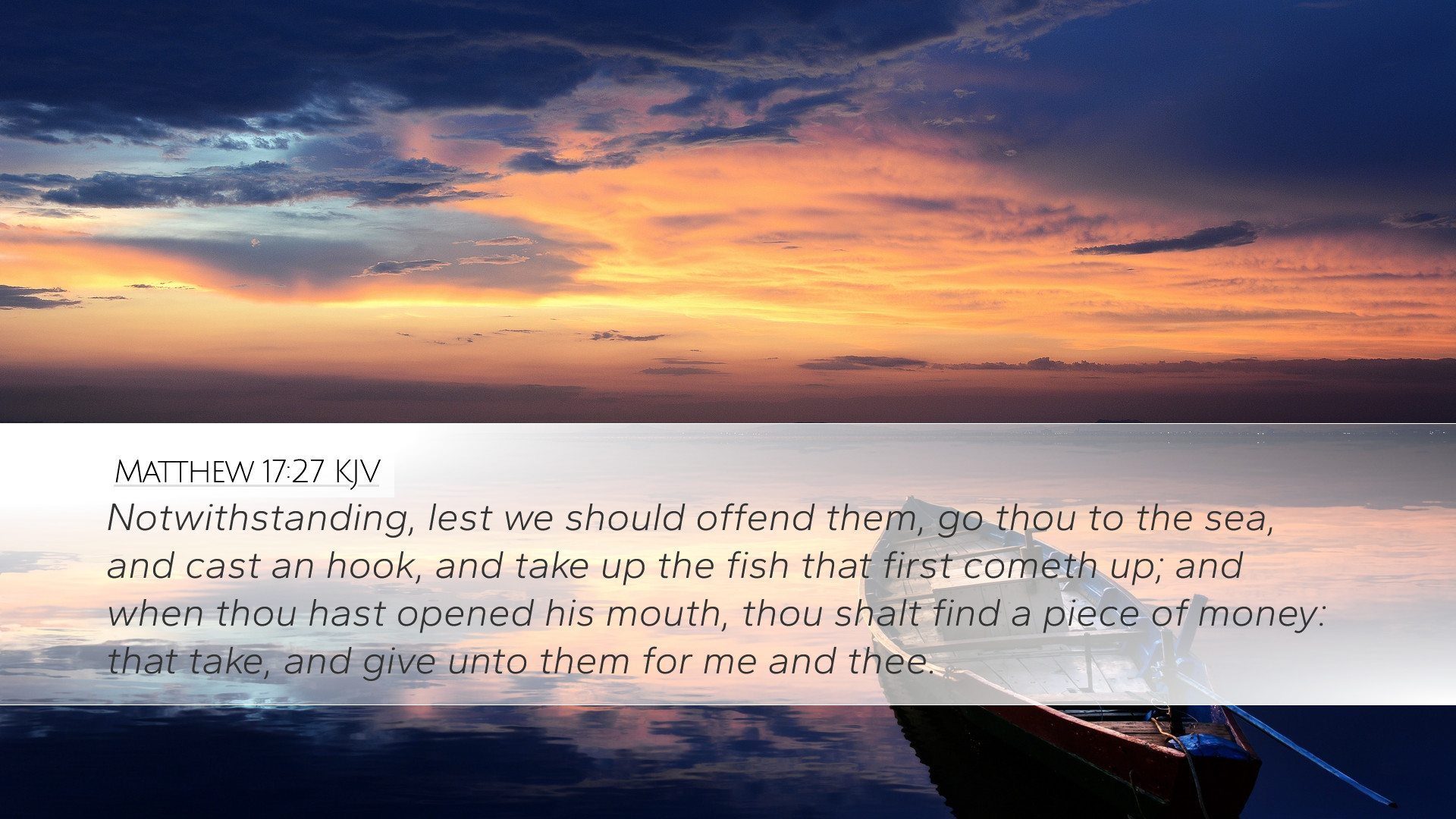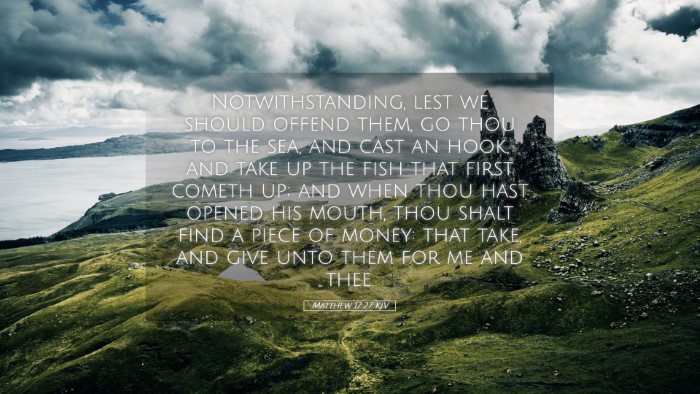Matthew 17:27 Commentary Summary
Bible Verse: "Notwithstanding, lest we should offend them, go thou to the sea, and cast a hook, and take up the fish that first cometh up; and when thou hast opened his mouth, thou shalt find a piece of money: that take, and give unto them for me and thee."
Introduction
This verse is part of an intriguing narrative demonstrating the intersection of faith and daily practical needs. It reveals significant theological insights about Jesus' identity and mission while underscoring His approach to civic duties.
Contextual Background
Matthew 17 presents a series of events occurring after the Transfiguration of Jesus. This verse concludes an episode concerning the temple tax, reflecting both the messianic implications of Jesus' ministry and His divinity.
Key Themes
- Authority of Jesus: Jesus indicates that as the Son of God, He is exempt from the temple tax, yet He chooses to comply to avoid causing scandal.
- Divine Provision: The miraculous provision of the coin in the fish’s mouth signifies not only Jesus' authority over creation but also God's provision in our lives.
- Humility and Service: Jesus’ compliance with the tax reflects an attitude of humility and service, providing an example for His followers.
Commentary Insights
Matthew Henry
Matthew Henry emphasizes the miraculous nature of this event. He notes that in this passage, Jesus, though the King and Son of God, chose to pay the tax to avoid causing offense. This emphasizes the principle that sometimes, it is better to act with discretion and humility than to assert one’s rights. Furthermore, Henry points out the higher spiritual reality that Jesus manifests; He could have commanded the fish to bring Him the coin, but He instructed Peter to engage in an act of faith.
Albert Barnes
Albert Barnes provides further analysis on the significance of the temple tax within first-century Judaism. He explains that the tax was primarily a contribution to the upkeep of the temple, representing a reminder of the covenant relationship between God and His people. Barnes points out that by paying the tax, Jesus illustrates the importance of being a good citizen while also being mindful of spiritual priorities. His guidance to Peter to find the coin in a fish emphasizes the abundance of God's provision and the unexpected ways in which He meets our needs.
Adam Clarke
Adam Clarke elaborates on the miracle's implications regarding Jesus’ ability to perform the extraordinary in mundane circumstances. He argues that this incident is a testament to Christ’s sovereignty over nature and His omniscient knowledge of where the coin would be found. Clarke encourages believers to recognize that God can provide in stages that reflect His glory, often in ways that are not immediately apparent or expected.
Theological Implications
Christ’s Authority and Identity
This verse subtly reinforces the identity of Jesus as both fully divine and fully human. He possesses all authority, yet He exhibits humility. This duality invites reflection on how followers of Christ are to engage with societal norms while maintaining a distinct Christian identity.
Faith in Action
The action of casting a hook and catching a fish reflects the engagement of faith with the world. The fulfillment of Jesus’ instruction leads to miraculous provision. This serves as a vital lesson that while Christians may fulfill worldly responsibilities, they should also trust in God’s provision, often in surprising ways.
Practical Applications
- Dealing with Conflicts: Believers should strive to act wisely and humbly in situations where legal obligations and faith intersect.
- Trusting God for Provision: Faith should be exercised in everyday life, trusting that God can provide for our needs, often in extraordinary ways.
- Living Out Our Faith: Christians are encouraged to reflect Christ's humility in their engagements with the world, prioritizing peace and service over self-assertion.
Conclusion
Matthew 17:27 encapsulates a rich tapestry of themes about Christ’s authority, divine provision, and the practicalities of faith in daily life. As followers of Christ, the call is to balance our responsibilities as citizens with our heavenly calling, trusting God’s miraculous provision and exhibiting Christ-like humility in our interactions with the world.


